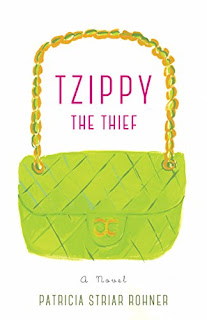 Tzippy is the story of a vain, self-indulgent, superficial, pampered
and narcissistic 80-year-old woman, at the head of a dysfunctional family. She
lives in Florida with her live-in, African-American maid. In her latter years,
she is in a relationship with Stan, a long-time friend of the family, and
especially of her late husband.
Tzippy is the story of a vain, self-indulgent, superficial, pampered
and narcissistic 80-year-old woman, at the head of a dysfunctional family. She
lives in Florida with her live-in, African-American maid. In her latter years,
she is in a relationship with Stan, a long-time friend of the family, and
especially of her late husband.
This is a well-written and well-edited story. The prose is
crisp and concise. Scenes are created vividly, but with a minimum of excess. At
times the writing has an almost journalistic feel. Even during Tzippy’s periods
of introspection the author refrains from hyperbole and excess. Nevertheless,
Tzippy’s feelings, thoughts and worldview are perfectly apparent to the reader.
Only in Chapter 18 did I feel that the writing faltered a little, becoming
somewhat stilted and hurried.
In the course of the narrative, various of her
children—Shari, Bruce and Naomi—and their spouses and partners come on stage,
but the main thread concerns Tzippy’s relationship with her younger daughter,
Shari, forty-something and an alcoholic. In her younger days—and perhaps
still—Shari suffered from anorexia-bulimia. It becomes Tzippy’s late-life
crusade to do what she can to heal this relationship and repair some of the harm
she has done to the daughter.
Tzippy also has to face two other issues in her life. She is
addicted to benzodiazepines, although she does not at first acknowledge this.
The author walks a fine line here, and some readers might think that she
overplays the irony as Tzippy reflects upon her daughter’s excessive alcohol
consumption, while at the same time popping another pill.
The other issue Tzippy has to deal with is her proneness to theft.
She is caught on this occasion and has to deal with the humiliation. At the
same time her maid of many years—Angie—is caught stealing money from Tzippy.
Again, the irony may be a little overplayed; but, again, it is a fine Iine.
The narrative is related exclusively from the intimate,
third-person point of view of Tzippy. She is very much centre stage. This lends
her an almost celebrity status: she is very much the star of her life, and of
the scenes that play out. This is true even when she seems to be focused on the
well-being of others. No matter how much she tries to reach out to others,
somehow the story is always still about her. There is a tension here, because
it is clear that at times Tzippy really does want to be less selfish and less
self-centred; yet, somehow, she is never far from the centre of the narrative, or
from her own concerns.
The other characters are mostly well drawn. Shari, the
younger daughter, is interesting and complex. Even at her most down and out
there is an attractive vulnerability to her. The reader also suspects that she
knows very well how to use this to her advantage. She has learned manipulation
from a master manipulator. The characterisation of the maid, Angie—an
overweight African-American woman with a love for caftans—flirts with
caricature, but perhaps just avoids it. Tzippy’s love interest, Stan, seems
rather shallow and ineffectual, although I think the author’s intention is to
present him as practical, down to earth and balanced. Perhaps he is, but
against the bright colours of the other characters, he seems somewhat pale and
insipid.

an interesting book. Interesting comment that about liking the lead character. I have never really thought about that. I know when I read 'The Great Gatsby' I felt sorry for Gatsby for being so intent creating the perfect environment to win over Daisy; and at the same time, not liking his character at all for not seeing the ridiculous silliness of the pampered rich status demands.
ReplyDelete